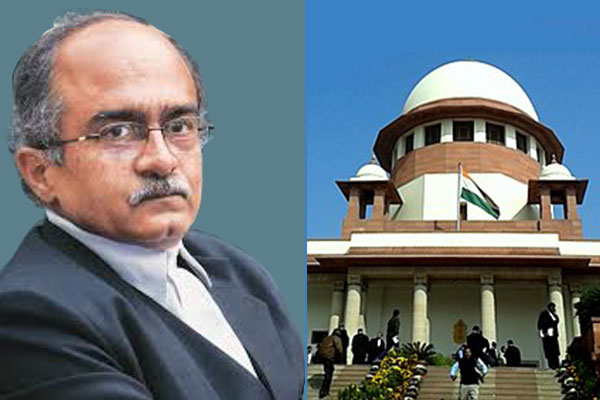August 20, 2020
Prashant Bhushan quotes Mahatma Gandhi and states that he will cheerfully accept the punishment that will be given to him
[ by Legal Era News Network ]
The Supreme Court on August 20 told the counsel appearing for advocate Prashant Bhushan, during a hearing on sentencing in a contempt case where the court held Bhushan guilty, that the court has always been fair to him, but do not know whether he has been fair to the court.
A bench headed by Justice Arun Mishra told senior advocate Dushyant Dave, representing Bhushan, “We are always fair to you. We do not know whether you are fair to us.”
The bench told Dave if it were to impose a sentence on Bhushan, held guilty of contempt, the sentence will not be carried out till he files a review plea against the August 14 verdict, and it is decided by the Supreme Court.
On August 14, the Apex Court held Bhushan guilty of making derogatory remarks against the judiciary through two tweets, which were later disabled by the Twitter. The Court said it is not keen on entertaining a plea by Bhushan to defer hearing on sentence till his review petition against conviction for criminal contempt is decided. The bench said the judgement is complete only after the sentencing.
During the hearing, Bhushan quoted Mahatma Gandhi and contended that he will not apologise for the two tweets and would cheerfully accept the punishment that will be given to him. He said that he would paraphrase what Mahatma gandhi said during his trial, “I do not ask for mercy. I do not appeal to magnanimity. I am here, therefore, to cheerfully submit to any penalty that can lawfully be inflicted upon me for what the Court has determined to be an offence, and what appears to me to be the highest duty of a citizen.”
Bhushan said “inflict any penalty on me for that which the court considers an offence, and I consider to be my bonafide duty”.
Advocate Prashant Bhushan has issued a statement expressing his dismay at being held guilty of contempt, despite his efforts to uphold the majesty of the Supreme Court at some personal and professional cost.
He was disappointed at the manner in which his case was conducted, a copy of the complaint on the basis of which the suo motu notice was issued was also not served to him. He said that he was also distressed at the fact that the Supreme Court did not find it necessary to respond to the specific averments made by him in his reply affidavit.
He has reiterated that his remarks on Twitter were “bonafide”, and in discharge of his duty as an officer of the Court and emphasized on the need to allow “fair criticism” in a democracy, to safeguard the “constitutional order”.
Read More
